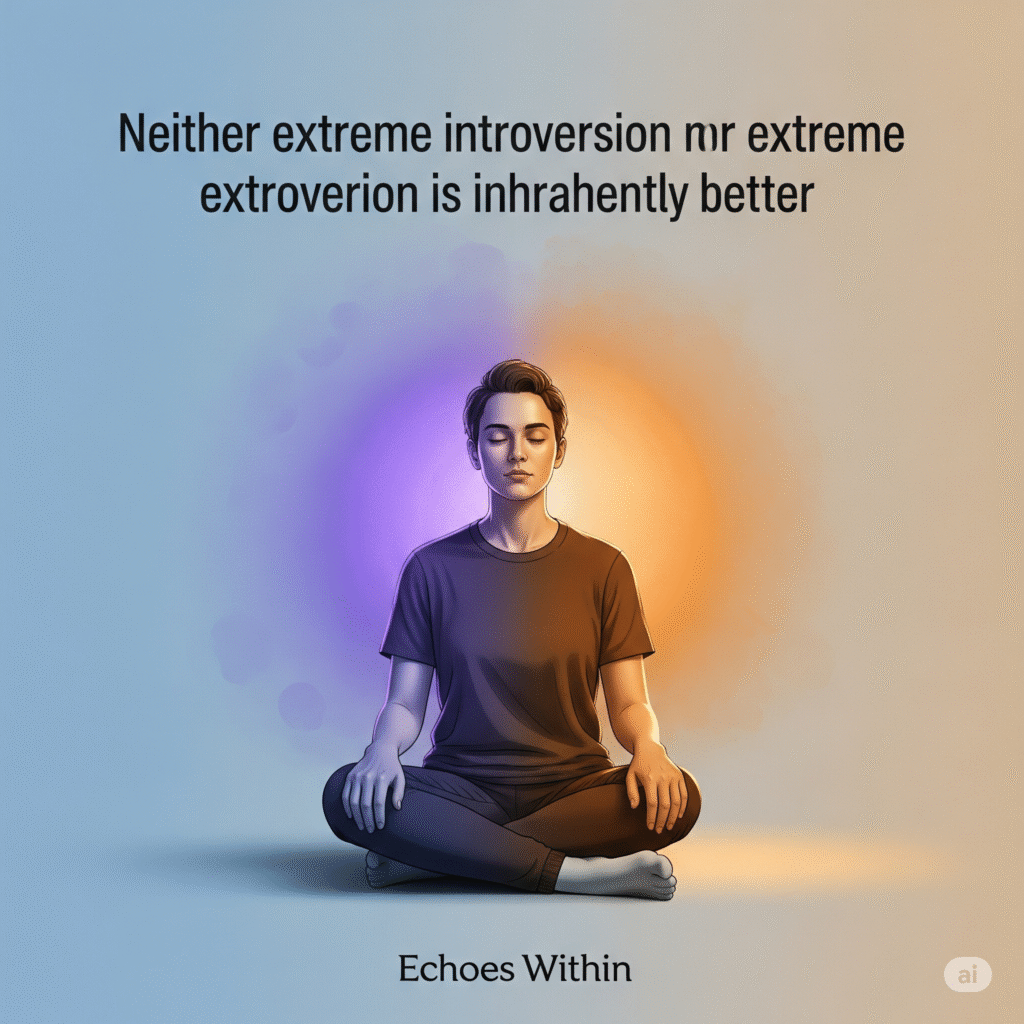Extreme Introversion Vs Extreme Extroversion
In a world that often seems to champion the outgoing and the vocal, it’s easy to assume that extroversion holds the upper hand. Conversely, the quiet strength and introspective nature of introverts can sometimes be undervalued or misunderstood. But what happens when these tendencies reach their extremes? Is one truly superior to the other? This exploration delves into the nuances of extreme introversion and extreme extroversion, challenging the notion of a personality hierarchy and revealing that neither end of the spectrum inherently holds the key to a “better” way of being. Instead, we’ll uncover the unique strengths, potential challenges, and valuable perspectives that both extremes offer, ultimately advocating for a greater understanding and appreciation of the full spectrum of human personality.
Both are valid personality types with unique strengths and potential challenges. What really matters is self-awareness and how well a person adapts to their environment while staying true to who they are.
Let’s compare the two thoughtfully:
🌿 Extreme Introversion: Strengths & Challenges
✅ Strengths:
-
Deep thinking and reflection
-
Focused attention and concentration
-
Independent problem-solving
-
Strong listening and observation skills
-
Creativity and introspection
⚠️ Challenges:
-
May struggle in group environments or fast-paced networking
-
Risk of social isolation or overthinking
-
Can be misunderstood as shy, aloof, or antisocial
-
May avoid opportunities that require self-promotion
🌞 Extreme Extroversion: Strengths & Challenges
✅ Strengths:
-
High social energy and charisma
-
Excellent team collaboration and verbal communication
-
Quick at forming connections and influencing others
-
Thrive in dynamic or high-stimulation environments
⚠️ Challenges:
-
May struggle with alone time or deep reflection
-
Can overlook details or act impulsively
-
Risk of burnout from constant engagement
-
May dominate conversations or overlook others’ input
🔄 So, which is better?
➤ It depends on the context:
-
A researcher or writer might thrive with introverted traits.
-
A salesperson or event coordinator might benefit from extroverted energy.
-
In relationships, balance matters—introverts and extroverts often complement each other.
✅ The Best Approach? Embrace Your Core—Balance Your Edges
Even though most people lean one way, true psychological health often lies in flexibility. An introvert who can assert themselves socially when needed, or an extrovert who can enjoy solitude and self-reflection, will likely thrive more consistently.
This idea is supported by psychologist Carl Jung’s concept of “ambiversion”, where the ideal is to draw from both ends of the spectrum based on the situation.
💬 Final Thought:
Rather than asking “Which is better?”, ask “Which helps me thrive in this moment?”
Whether you’re introverted or extroverted—or somewhere in between—self-awareness and adaptability are far more important than fitting into one category.
📚 For Further Reading:
The Pursuit of Perfectionism: When Good Enough Isn’t Enough
The Elusive Art of Discipline: Why We Struggle and How to Find Our Rhythm
🔥 Why the Feminine Is Worshipped and Feared: Unravelling the Gate of Hell Paradox
The Rise of Digital Nomads: Is This the Future of Work?
The Hidden Fire: Understanding and Honouring the Anger of Housewives
The Introvert Advantage: How Quiet People Can Thrive in an Extrovert World
BBC Worklife – “The Extrovert Ideal: How Western Culture is Biased Against Introverts”
https://www.bbc.com/worklife/article/20200113-how-western-culture-is-biased-against-introverts


Can you be more specific about the content of your article? After reading it, I still have some doubts. Hope you can help me.
Can you be more specific about the content of your article? After reading it, I still have some doubts. Hope you can help me. https://www.binance.info/tr/register?ref=MST5ZREF
Your article helped me a lot, is there any more related content? Thanks! https://accounts.binance.com/ro/register?ref=HX1JLA6Z